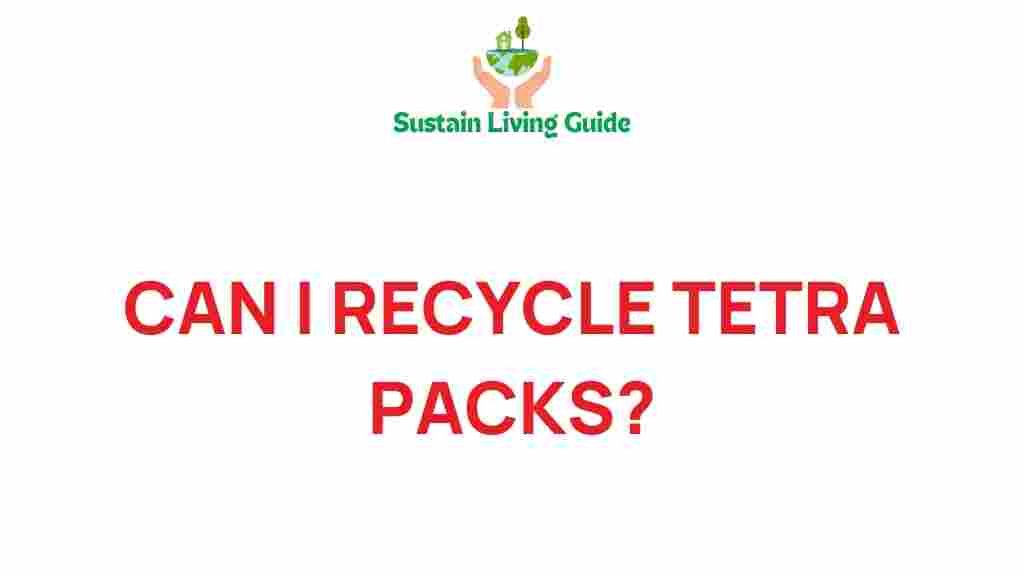Tetra Packs: Unraveling the Mystery of Their Recyclability
Tetra Packs are a popular packaging choice for beverages and food products, known for their convenience and ability to extend shelf life. However, a common question arises: can you really recycle Tetra Packs? Understanding the recycling process, the materials involved, and the local regulations can help demystify the recycling of these containers. In this article, we will explore the intricacies of Tetra Packs, guide you through the recycling process, provide troubleshooting tips, and conclude with some sustainable practices.
What are Tetra Packs?
Tetra Packs are made from a combination of materials, including:
- Paperboard
- Plastic
- Aluminum
This multi-layer construction allows Tetra Packs to protect their contents from light, oxygen, and bacteria, making them ideal for products like juice, milk, and soups.
The Recycling Process for Tetra Packs
Recycling Tetra Packs involves a series of steps designed to separate the different materials for reuse. Here’s a step-by-step process:
- Collection: Tetra Packs are collected at recycling centers or through curbside pickup, depending on local regulations.
- Sorting: Once collected, Tetra Packs are sorted at recycling facilities. This is crucial as not all recycling facilities can process them.
- Shredding: The sorted Tetra Packs are then shredded into smaller pieces to facilitate further processing.
- De-laminating: The shredded materials undergo a process to separate the paper, plastic, and aluminum layers. This is typically done using water and mechanical processes.
- Recycling the Materials: The separated materials are then processed separately. The paper can be recycled into new paper products, while the plastic and aluminum can be used in various manufacturing processes.
Can You Recycle Tetra Packs at Home?
While Tetra Packs can be recycled, you cannot typically recycle them at home. It is important to check your local recycling guidelines to determine whether Tetra Packs can be placed in your curbside recycling bin. In many areas, they need to be taken to specific recycling centers.
Why is Recycling Tetra Packs Challenging?
The recycling of Tetra Packs faces several challenges:
- Multi-material Composition: The combination of paper, plastic, and aluminum makes recycling complex.
- Limited Facilities: Not all recycling facilities are equipped to handle Tetra Packs, leading to confusion about their recyclability.
- Contamination: If Tetra Packs are not properly rinsed, food residues can contaminate the recycling stream, making it more difficult to process.
How to Prepare Tetra Packs for Recycling
To increase the chances of your Tetra Packs being recycled, follow these steps:
- Empty the Pack: Make sure to pour out all contents.
- Rinse with Water: A quick rinse can help remove any residual food or drink.
- Flatten the Pack: This saves space and makes it easier for recycling facilities to handle.
- Check Local Guidelines: Always verify if your local recycling program accepts Tetra Packs.
Troubleshooting Common Issues
Even with proper preparation, you may encounter issues when trying to recycle Tetra Packs. Here are some troubleshooting tips:
- Issue: My local recycling center doesn’t accept Tetra Packs.
Solution: Look for nearby recycling centers that specialize in Tetra Packs or check with local waste management for alternate solutions. - Issue: My Tetra Packs keep ending up in the trash.
Solution: Educate your family and friends about the importance of recycling Tetra Packs and the steps involved. - Issue: I’m not sure if my Tetra Packs are clean enough.
Solution: If in doubt, give them an extra rinse to ensure they are free of contaminants.
The Environmental Impact of Tetra Packs
Understanding the environmental impact of Tetra Packs is essential to making informed choices. While Tetra Packs can be recyclable, they still pose challenges:
- Landfill Waste: If not recycled properly, Tetra Packs can contribute to landfill waste.
- Resource Consumption: Manufacturing Tetra Packs requires significant resources, including water and energy.
- Carbon Footprint: Transportation and processing of Tetra Packs contribute to greenhouse gas emissions.
Alternatives to Tetra Packs
If you’re concerned about the environmental impact of Tetra Packs, consider these alternatives:
- Glass Containers: Reusable and recyclable, glass is an excellent alternative for beverages.
- Metal Cans: Often more readily recyclable than Tetra Packs, metal cans are another option.
- Reusable Bottles: For personal use, opting for reusable bottles can significantly reduce waste.
Conclusion: Making Informed Choices
While Tetra Packs offer convenience and shelf stability, their recyclability can be a complex issue. By understanding how Tetra Packs are made, the recycling process, and potential challenges, you can make informed decisions about their use and disposal. Always check your local recycling guidelines to ensure that you are recycling effectively.
For more information on recycling and sustainability practices, visit the EPA’s recycling page.
By taking these extra steps, you can contribute to a more sustainable future while enjoying the convenience that Tetra Packs provide.
This article is in the category Waste and created by SustainLivingGuide Team
